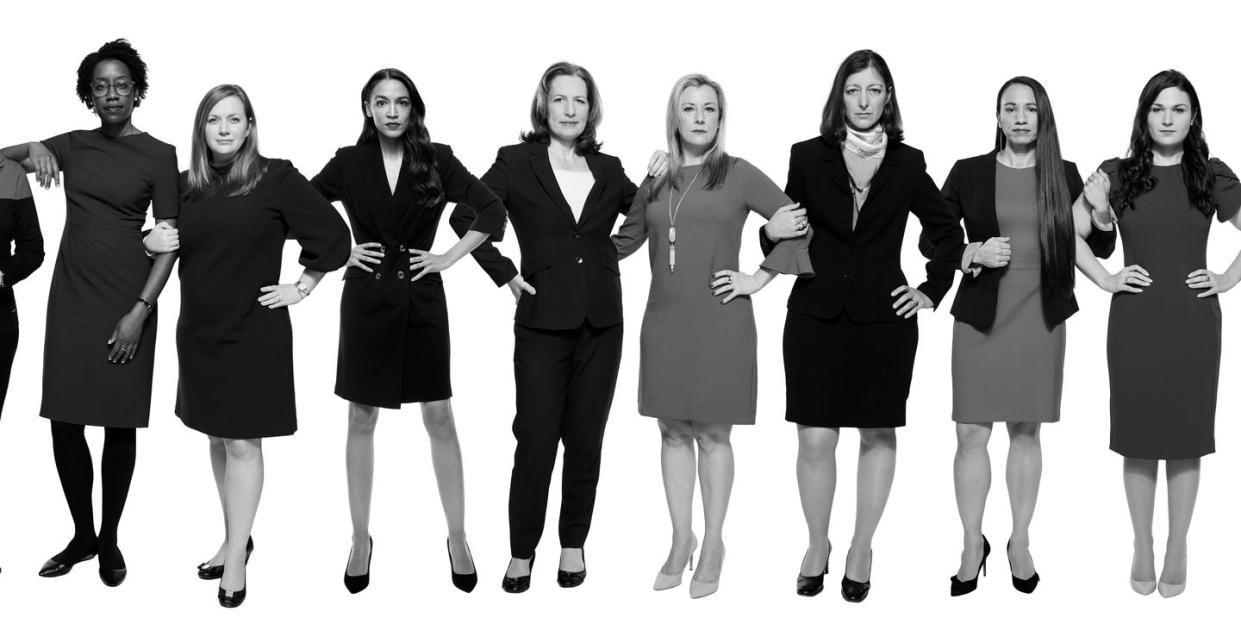A Woman's Place Is in the House

On November 6, 2018, 35 new women were elected to the U.S. House of Representatives, making this incoming class the most diverse by race and gender in the body’s 230-year history. They join nearly 70 women incumbents, resulting in over 100 women representatives. To commemorate the milestone, photographer Christelle de Castro captured 27 of the Members-Elect during their first week of Orientation. (The eight who weren’t photographed were unavailable due to scheduling conflicts). Journalist Jill Filipovic expounds on the significance of the moment.

It was Ayanna Pressley, at the airport, who finally got to me. This past November, two years after Donald Trump lost the popular vote but still won the White House, a record number of women swept to victory in the midterm elections. When they are sworn into Congress on January 3, among them will be the first Muslim congresswomen, the first Native American congresswomen, and the first African American congresswomen from New England-Jahana Hayes and Pressley. En route to freshman orientation in Washington, DC, Pressley tweeted a photo of herself at the airport, looking jaunty in an olive coat and page-boy cap. The photo caption referenced the movie Mr. Smith Goes to Washington, but Pressley advised her followers to “scratch that,” and replace Mr. Smith with “Sandy Pressley’s daughter, Mrs. Ayanna Soyini Pressley Harris.” She then thanked the late Shirley Chisholm, the first black woman elected to Congress and a 1972 presidential candidate.
After two years of stewing darkly in the cynicism of post-2016 America, I thought any spark of political optimism I may have once held had been tamped down to embers. For as long as America has been a nation, Congress has been dominated by white men. Women like Chisholm chipped away at the seemingly immovable, forever truth of white male majority rule; women like Hillary Clinton-even if she did not ultimately win the presidency-did, too. And here was Pressley, asserting her place on that trajectory. Things do not improve or progress by themselves. Pressley at the airport flying to Washington-all of these women taking their seats in Congress-is one more marker of progress within a long history of hard-won victories and agonizing failures.
Looking into Pressley’s face smiling back at me from my phone, I felt, for the first time in a long time, a little bit of light seep in.
I was admittedly late to the optimism party. In the months leading up to the midterms, women (and a lot of men) around the country had been busting their butts to elect those who would go on to make up the most diverse Congress ever. They were fueled by steady determination and simmering fury. Trump’s inauguration coincided with the largest march in U.S. history, an event focused on women’s rights and attended by millions who seemed simultaneously outraged and a touch sheepish at their own complacency. Too many people had been too comfortable, too sure that the hypercompetent, overly qualified woman would beat the reality TV star, an unrepentant misogynist who had never held elected office. 2016 was an awakening. And when the 2018 midterms rolled around, these women weren’t about to make the same mistake twice.
The women who rode the pink wave to Congress are not business-as-usual politicians. They’re young, lesbian and bisexual, women of color, immigrants. Women who clap back to haters on Twitter. Women who can’t afford their rent until their new job starts.
Several congresswomen Instagrammed and tweeted their trips to Washington, conversing directly with constituents and exuding both excitement about their new roles and respect for the gravity that comes with public service. They showed how the process works, demystified it, made politics look fun. Following them on social media felt human and relatable. Their unvarnished enthusiasm also betrayed a total lack of entitlement. Unlike so many congressmen before them, the women posting selfies from DC never presumed that the title of “congresswoman” was their birthright.
But of course, breaking the old rules-or even just doing things a little differently-is never cost-free. The new class has faced skepticism often out of proportion to its actual influence, scrutiny that goes beyond typical political hardball. During congressional orientation, Alexandria Ocasio-Cortez, who at 29 is the youngest woman to serve in Congress, tweeted that staff repeatedly mistook her for an intern or a spouse; several right-wing commentators called her a liar. The next day, someone on the Hill took a covert photo of Ocasio-Cortez in a fairly unremarkable but perfectly professional outfit, and a conservative journalist tweeted it out, remarking, “That jacket and coat don’t look like a girl who struggles.” The snark was meant to undermine Ocasio-Cortez’s earlier disclosure that she needs her congressional salary to kick in before she can afford rent in DC.
Ocasio-Cortez has been something of a lightning rod for political controversy, mostly because she’s an outspoken, far-left young woman who is attractive but in no way submissive or compliant (a combination that triggers a special kind of rage in her detractors). Among her new female peers in Congress, she has gotten both the bulk of the coverage and the bulk of the public criticism. But her experiences, which she has documented on social media, are just a preview of what she and her similarly situated colleagues will surely face. When they start pushing for real change, things are going to get worse-much worse.
Women in power almost never have an easy path.
While backlash and disappointment are likely, disillusionment is only as powerful as we make it. That isn’t a plea for overlooking craven decision-making or political expediency, but rather an offering to savor this particular moment and know that the highs are what sustain and arm us for the unavoidable lows. Change begets change, and this moment marks not the conclusion of a struggle, but one signpost in a longer journey toward a truly equitable nation. Let the record show that in 2018, we crept ever closer to a Congress that is truly by and for the people.
This is a seismic shift; such significant movement means the ground under our feet may not always feel stable. Right now, we fortify our roots by soaking up the joy of advancement and basking in the glow of Instagram feeds of women who look nothing like Mr. Smith, and who are revolutionizing Washington.
Hair and makeup by Ellen Guhin for Amika and Becca Cosmetics
('You Might Also Like',)